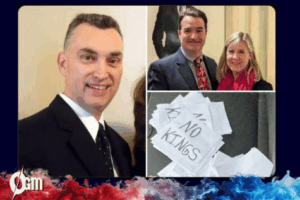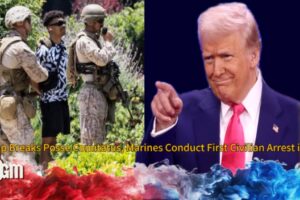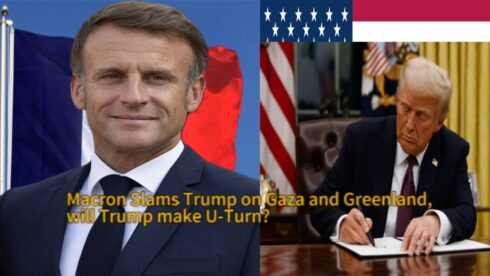French President Emmanuel Macron has sharply criticized U.S. President Donald Trump’s foreign policy, citing his stance on Gaza and Greenland as examples of “extreme strategic uncertainty.” Emmanuel Macron’s remarks, made during a high-profile security summit, highlight deepening concerns among European leaders about the unpredictability of U.S. foreign policy should Donald Trump return to office.
The French leader’s comments come at a time of heightened global instability, with ongoing conflicts in the Middle East and growing geopolitical tensions over territorial claims. Emmanuel Macron’s warning underscores the broader European anxiety over what some see as Donald Trump’s transactional approach to diplomacy, which often prioritizes short-term political gains over long-term stability.
Donald Trump’s Gaza Strategy Sparks European Concerns
One of Emmanuel Macron’s major points of contention is Donald Trump’s stance on Gaza, which has been marked by unwavering support for Israel and a hardline approach to Palestinian aspirations. During his presidency, Donald Trump’s policies—such as relocating the U.S. embassy to Jerusalem and cutting aid to Palestinian refugees—were widely seen as a departure from traditional diplomatic efforts to broker peace.
European leaders fear that Trump’s potential return could escalate tensions in the region further. Emmanuel Macron’s remarks suggest that the EU is bracing for a scenario where U.S. policies in the Middle East shift drastically, potentially undermining European-led peace initiatives and inflaming an already volatile situation.
Greenland Controversy Resurfaces in Macron’s Critique
Emmanuel Macron also pointed to Donald Trump’s 2019 attempt to purchase Greenland from Denmark as an example of erratic strategic decision-making. The proposal, which was widely ridiculed at the time, was framed by Donald Trump as a geopolitical move to counter China and Russia’s Arctic ambitions. However, it was met with outright rejection from Denmark, with Prime Minister Mette Frederiksen calling it “absurd.”
For European allies like France, the Greenland episode highlighted a broader concern: Donald Trump’s willingness to disrupt established diplomatic relationships with unconventional and unpredictable proposals. Emmanuel Macron’s criticism signals that European leaders remain wary of how Donald Trump’s approach to global strategy could impact transatlantic alliances if he returns to power.
U.S.-France Relations at a Crossroads
Emmanuel Macron’s pointed remarks reflect growing tensions between France and the U.S., particularly when it comes to strategic decision-making. While President Joe Biden has worked to repair alliances frayed during Donald Trump’s tenure, there remains skepticism in Paris about Washington’s long-term reliability.
France has been increasingly vocal about its desire for Europe to develop a more independent foreign policy, reducing reliance on the U.S. Emmanuel Macron’s speech appears to be part of a broader push to prepare Europe for a geopolitical landscape where American leadership is less predictable and potentially more unilateral.
Donald Trump’s Response: Dismissal or Counterattack?
Donald Trump has not yet directly responded to Macron’s latest comments, but if history is any guide, a sharp rebuke may be imminent. Throughout his presidency, Donald Trump frequently clashed with European leaders, often dismissing their concerns as globalist fearmongering. In past exchanges, he has accused Emmanuel Macron of being weak on defense and overly dependent on NATO protection.
Given Donald Trump’s combative history with international critics, Emmanuel Macron’s remarks could provoke a fiery response, potentially reigniting debates over NATO funding, European military independence, and America’s role in global security. A renewed Trump-Macron feud would further strain U.S.-Europe relations, leaving many to wonder how transatlantic diplomacy would evolve in the years ahead.
Europe’s Next Move: Preparing for Uncertainty
Emmanuel Macron’s statements highlight a larger European strategy shift as leaders prepare for possible U.S. policy reversals. France, along with other EU powers, is expected to push for greater military and economic autonomy, particularly in areas where American leadership has wavered.
With the 2024 U.S. presidential election approaching, European leaders are watching closely. Whether Donald Trump reenters the White House or not, Emmanuel Macron’s speech signals a readiness to navigate an uncertain global order, with or without firm U.S. support.














